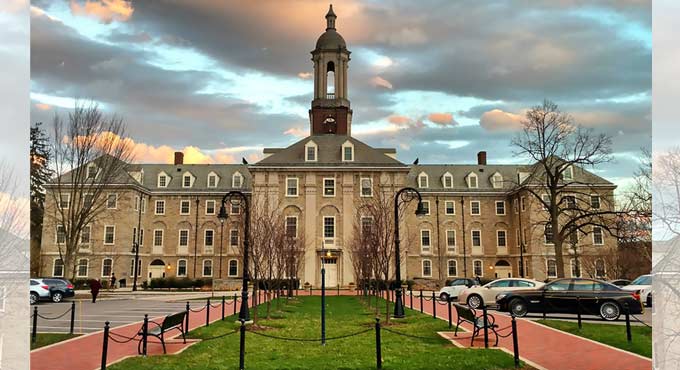Penn State University: Research center will help industries connect with Penn State’s AI prowess
In a world of increasingly complex supply chains, quickly shifting workforce trends, a deepening need for productivity, and a need for addressing societal challenges, organizations are looking at artificial intelligence (AI) and machine learning (ML) (collectively AI/ML) as an ally to navigate the competitive landscape and deliver needed goods and services to customers.
Penn State’s Institute for Computational and Data Sciences (ICDS) has announced the creation of the Center for Applications of Artificial Intelligence and Machine Learning to Industry, or AIMI (pronounced Aim-ee), which will connect experienced AI/ML researchers at Penn State with industry partners to identify and pursue collaborative, industry-sponsored, exploratory research projects. The funding model uses industry memberships similar to how the National Science Foundation has created Industry-University Cooperative Research Centers (IUCRC), for which Penn State has six. The IUCRC experience has enabled Penn State to refine how AIMI can position research to readily tackle industry challenges while also advancing new AI and ML research directions.
“The AIMI center brings a fresh, dynamic opportunity for industries to partner with Penn State. The membership model allows partners to directly communicate their top research needs in AI and ML while remaining apprised of hot trends globally,” said Lora Weiss, senior vice president for research at Penn State. “Our industry partners want to be engaged in the advances we are making in AI and ML, and by pooling their interests, we are powering top partnerships to address critical issues.”
Soundar Kumara, Allen E. Pearce and Allen M. Pearce Professor of Industrial Engineering at Penn State, who is a pioneer in the application of AI/ML in smart manufacturing and health care, has stepped up to serve as the research center’s inaugural director.
The membership model will provide industry partners with access to cutting-edge AI-related projects and enable them to collaborate directly with Penn State researchers on those projects. Kumara said the innovative model will make AIMI a leading center for AI and ML research for business and industry.
“My vision is to make AIMI the global hub for AI and ML industry research,” said Kumara. “By joining forces with AIMI at Penn State, industry members benefit in many ways and become a community focused on advancing AI/ML research.”
Kumara said that AI-powered technologies are dramatically transforming health care, finance, business, manufacturing and nearly every industry sector. The technology is helping businesses to create new tools for machine monitoring, weather prediction, e-commerce, education, defense and more. Kumara’s own research has used AI to optimize complex supply chains, offer warnings for illicit online pharmaceutical sales, and monitor manufacturing equipment, among other topics.
Kumara stressed the careful need for organizations to use evidence-based research when they incorporate AI and ML tools.
“AI and ML applications to broader industry problems need careful thinking to evaluate what is important and what is irrelevant. It is not simply throwing data at the algorithm and collecting the responses; we need to focus on interpretability and explainability,” added Kumara. “Though high-accuracy algorithms are great, algorithms that are scalable, interpretable and explainable take the front seat. AI and ML algorithms must also be fair and unbiased. This will be the focus of AIMI.”
AIMI will serve as a critical hub to connect business and industry with Penn State’s world-class expertise in AI and ML. Penn State has more than 400 researchers using AI or ML methods in their innovative research, publishing on topics such as detecting discrimination, monitoring the health of mothers and children, predicting severe weather, diagnosing crop diseases, studying river water quality, guiding online privacy decisions, improving suicide prevention interventions, assisting with cancer diagnosis and treatment paths, tracking hurricanes, designing better chemical catalysts, and speeding up vaccine manufacturing, among other cutting-edge projects.
“We think of AIMI as the perfect catalyst to combine the power of AI with the ingenuity of our researchers and our partners in business and industry to create needed solutions and to seize new opportunities,” said Todd Price, corporate relations director for research in the Penn State Institute for Computational and Data Sciences.
“AIMI is uniquely positioned to combine Penn State’s global reputation of building interdisciplinary research teams with the expertise of the center’s industry partners to provide an effective platform for industry-relevant, impactful research into AI and ML,” said Jenni Evans, professor of meteorology and atmospheric science and ICDS director.
“This center will serve as a nexus to everything Penn State is renowned for: innovation, interdisciplinary collaboration and expertise in using artificial intelligence to solve real-world problems,” Evans added.
In addition to talented faculty and other researchers, AIMI will leverage Penn State’s administrative organization and processes, and ICDS’s expertise, as well as its Roar supercomputer and its computational and data infrastructure to execute AIMI’s mission, according to Gretta Kellogg, assistant director of AIMI.
“Through AIMI, we have set up a membership model that encourages industry to partner with Penn State faculty from across the various disciplines, and the Research Innovations with Scientists and Engineers (RISE) team’s AI/ML programming experts,” said Kellogg. “It provides an easy entrance for companies who want to explore working with the latest technologies to meet and develop new solutions with faculty, while engaging with students for internship opportunities or to hire students with relevant experience working on areas of interest for their own projects.”
Kellogg added that the initiative takes a big tent approach to uniting the dynamism of AI research at the University with entrepreneurship around the globe.
“AIMI is also looking for ways to include the faculty and students across all campuses because there are potential industry partnerships available across the state,” said Kellogg. “We want to help encourage small and medium companies to discover what a partnership with our AI researchers can enable them to accomplish, while at the same time, we can help the campus locations build workforce development pipelines that are best suited for the industry partners in their own regions.”

